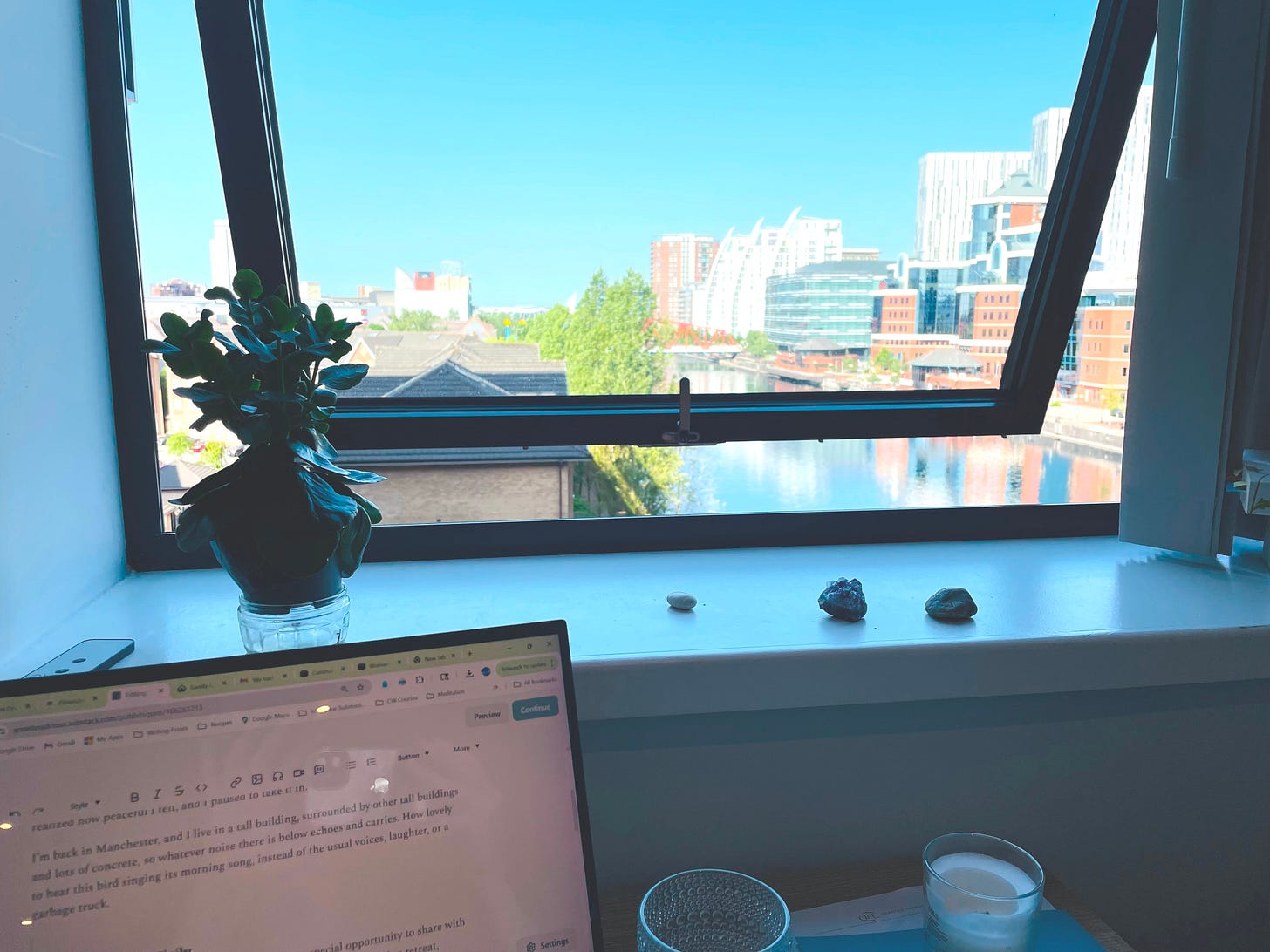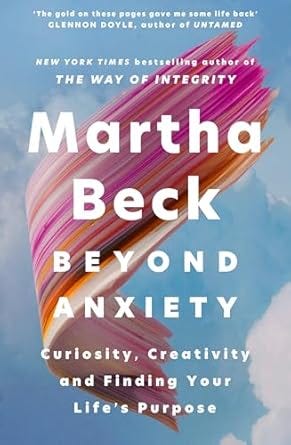Hello! How are you? I’m sitting at my desk in front of my window that looks out on a canal, listening to the most incredible bird song. I almost didn’t notice it, but then I realized how peaceful I felt, and I paused to take it in.
I’m back in Manchester, and I live in a tall building, surrounded by other tall buildings and lots of concrete, so whatever noise there is below echoes and carries. How lovely to hear this bird singing its morning song, instead of the usual loud voices, construction, or a garbage truck.
This newsletter is free for all. Sign up so you won’t miss a post.
In recent newsletters, I’ve been sharing my healing journey with you. I didn’t set out on this journey deliberately; I didn’t have much choice, really. My first priority was completing the coursework in my MA in Creative Writing at the University of Manchester. But I was having so much vertigo, fatigue, and brain fog that going to class and writing were a real challenge, not to mention daily tasks like shopping and feeding myself.
It could have been a disaster. The MA in the UK is a short course, only 1 year (two 10-week terms of classes and then a summer to write your dissertation). This was my semester with Jeanette Winterson, and I really didn’t want to blow it.
As it turned out, being sick was the best thing that could have happened to me—because the healing I needed to do also made me a better writer. I’m still processing this, but I noticed some startling leaps ahead that dovetailed with the healing practices I was doing. I found a capacity for creativity that I hadn’t felt before.
Being creative was always something that felt out of reach to me. I have always loved art, literature, theater, and music, and in college I designed my own major—Creativity and its Relation to Culture—which allowed me to dabble in a variety of art forms. I landed on literature as my greatest interest, but it was so hard for me to write creatively, so I went on to get a Ph.D. in American Studies. I ended up teaching and studying literature, instead of writing it.
It took a major life and identity crisis for me to leave academia and give myself the permission to write more creatively. Starting this MA was the ultimate test. I did okay first semester and got decent marks, but I still felt like I was on the outside looking in.
I was writing from my left brain, I’ve realized, the logical part that wants to explain and describe things. I’ve had to learn to get out of it—not only to write better, but also to heal myself.
The Left Brain and Anxiety
We live in a left-brain world, as Martha Beck writes in Beyond Anxiety. I loved this book so much that I bought a copy after listening to it and taking a ton of notes. (I also bought one for my daughter.) Her basic premise is that we can’t just get rid of anxiety; we have to replace it with its opposite: creativity. (No, the opposite of anxiety is not calm, she says.)
Anxiety is the enemy of creativity. It magnifies threats, focuses on the negative, and hates uncertainty. Have you ever embarked on a project or wanted to and been overwhelmed with thoughts like:
How will I ever find the time to make this thing?
What if I spend months or years making this thing and nobody wants to buy it and it just sits in a drawer?
Am I good/smart/creative enough to do this thing?
I got a B in my college writing class, what makes me think I can write a novel?
Maybe I should quit while I’m ahead.
I’ve had all those thoughts. They can stop you in your tracks. I now see that I was so used to living in my left-brain, where anxiety spirals are common, that I couldn’t even get out of the gate. Or, if I did, then I’d make it to page 3 or chapter 4 and crumble under the weight of my doubts and feelings of inadequacy.
Martha Beck has suggestions for how to ‘calm your anxiety creature,’ as she puts it. Anxiety emanates from the amygdala, the primitive, or ‘creature’ part of our brain. It spins stories, imagines worst possible scenarios, and spouts limiting beliefs.
It does this particularly in reaction to uncertainty—and there is nothing more uncertain than embarking on a creative project. Who knows where it will take you! The whole point of creativity is entering into the unknown.
Essentially, if we are feeling anxious, then our autonomic nervous system gets activated. We go into fight-or-flight and all we want to do is get rid of the threat, fix the situation we are in, or prevent something potentially catastrophic from happening. The mind is working overtime, fueling the fire of anxiety.
I can see now that I was in constant threat-management mode and living in a high state of arousal for YEARS in my old life. How could I possibly feel creative? Not to mention find the time to try something that might not yield concrete results.
So calming the nervous system and the mind are fundamental first steps toward healing AND living a more creative life.
Triggers, Trauma, and Blocks
Doing so is difficult, though, when the mind is getting triggered by trauma. I haven’t heard much about the links between trauma and blocked creativity, but I’ve become convinced there is a strong correlation.
A word about ‘trauma’: I’ve noticed that most people seem to automatically recoil from this word. ‘Trauma’ is supposed to mean something catastrophic, like an accident or the death of a loved one. But little-t ‘trauma’ refers to the wounds we carry inside of us as a result of events (particularly in childhood) that we couldn’t fully process or accept.
It’s vital, I believe, that we start to see ‘trauma’ as part of the human experience. As Sandy Newbigging (the therapeutic and spiritual coach I’ve been working with) says, it is unimaginable that a person would go through life without incurring physical injury. The same is true of emotional injury. And that is simply what trauma is. (See also Mark Epstein’s The Trauma of Everyday Life and Gabor Mate’s The Myth of Normal.)
The problem is that we know how to heal most physical injuries, and many don’t even require medical intervention—the body knows how to heal itself. The mind less so, it seems. It knows how to protect itself from pain that is too much for it to handle, usually by suppressing emotions, repressing memories, and/or sending the body into a freeze state. But in Western societies, we are only more recently learning how to help the mind heal.
In many cases, the body is expressing what the mind has suppressed. This is where a lot of physical ailments come from. In my case, I knew that medical intervention wouldn’t help much. Clearly something was going on in my mind to send me into anxiety spirals that made my mind spin almost literally.
Working with Sandy, we started with birth and worked our way forward. I discovered by talking to my mother that when I was born, she was feeling abandoned by my father, who was stationed in Korea (during the Vietnam War) and by her own father and stepmother, who didn’t want her living with them. (Her mother had died, which can certainly leave one feeling abandoned as well). She was living in an apartment by herself, preparing for my birth, and feeling rather alone. I don’t think it’s a coincidence that my vertigo attacks started three hours after I moved into a virtually empty apartment all by myself after feeling abandoned.
A Huge Leap Forward in My My Writing
Clearing that trauma, using Quantum Energy Coaching, is profound enough. But what happened afterwards felt miraculous to me. I had been struggling to find my way into a short story I had felt inspired to write in the previous workshop. The next morning after that session, I not only wrote over 2,000, but I felt the wall that had been standing between me and what I was trying to write fall away. I was able to imaginatively enter the scene in a way I never had before. That feeling of standing outside of it and looking in had dissipated. I went on, after many revisions, to write a story that received very positive feedback from Sarah Hall, herself a master short story writer. And when I went back to the novel, I felt as if I’d made a huge leap forward in my writing.
My growth as a writer this semester has a lot to do with Sarah’s and Jeanette’s instruction. (I look forward to sharing with you what I learned from them.) But I know that the QEC work has opened up a space in me that made it possible.
Having healed many emotional wounds from my childhood and adolescence, I have felt not only healthier and happier, but also like I finally know what it feels like to write creatively. Quite simply, I was able to get into the imaginative realm of the right brain.
As Martha Beck writes, without anxiety we are naturally creative and present. While the left brain obsesses over the past and worries about the future, the right brain has no sense of time. That is why when are in the creative flow, we lose sense of time. We are fully present with the work, not distracted by the compulsive thoughts of anxiety and trauma, and we are free of our minds in a way that allows us to enter into our characters’ worlds more fully.
I hope I haven’t made all of this seem too simple, because it’s anything but. But I wanted to share my experience and initial understanding of how anxiety and trauma block our creativity. This is something I’m developing a very strong interest in and will keep exploring.
I’d love to hear your thoughts about all of this, as always. How do you find anxiety or trauma showing up when you try to do something creative? What blocks have you felt in your way of living a more creative life?
Until next time,
Anne
P.S. Did you enjoy this post? If so, please click on the heart at the bottom or the top of this email/post. It helps me know what kinds of posts you value and helps others discover them.












Such a critical topic for us to understand during this uncertain time. Creativity is what we need MOST as we face our complex challenges and the added heaviness it brings, but it's the FIRST thing that shuts down when we are worried. Thank you for sharing this clear explanation and your own process, Anne.
My struggle with creativity has been almost identical to what you describe. I've got Martha Beck's book and I have access to some very good energy healing (lucky me!). You've given me a dose of hope. I can't thank you enough!